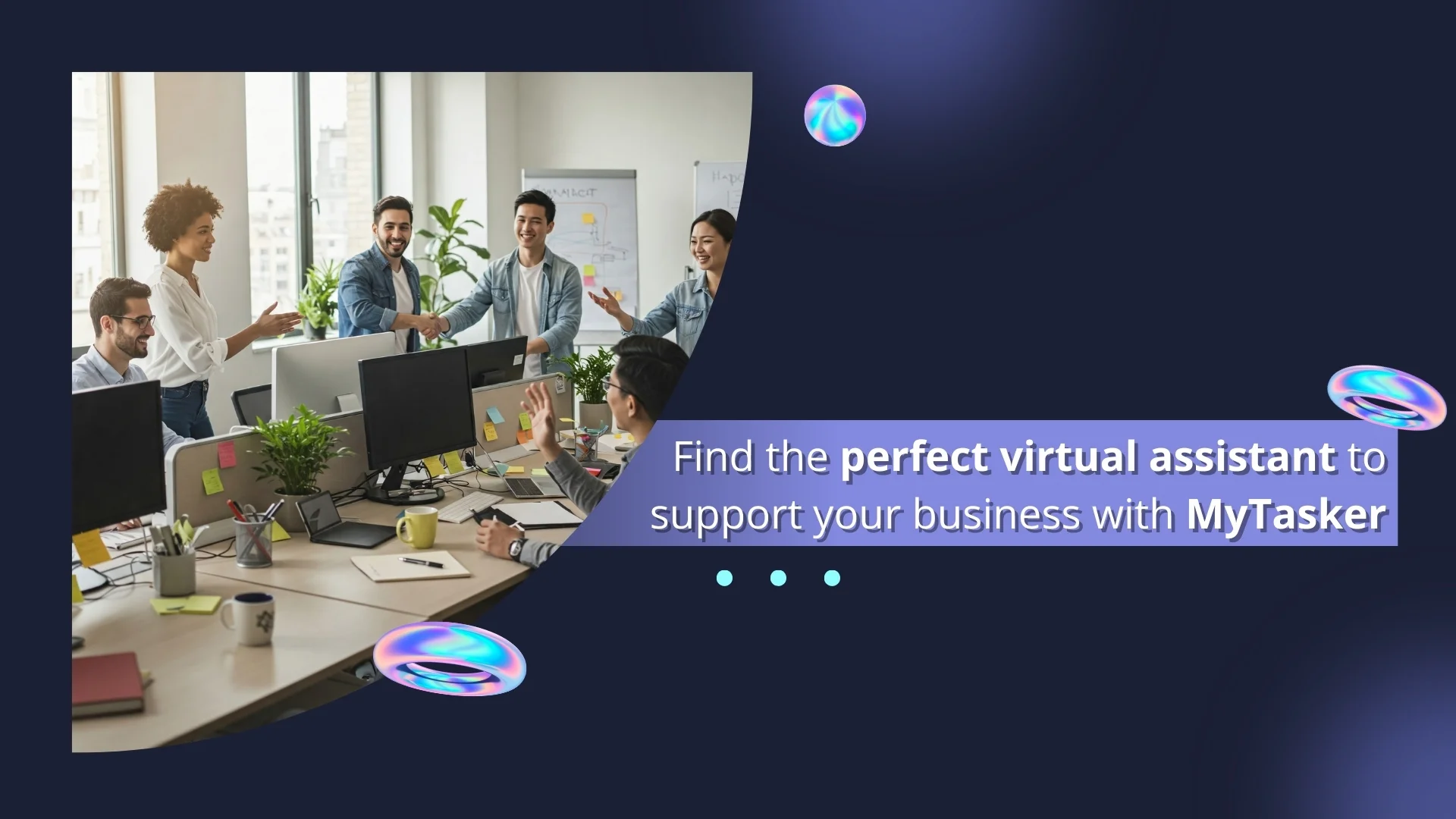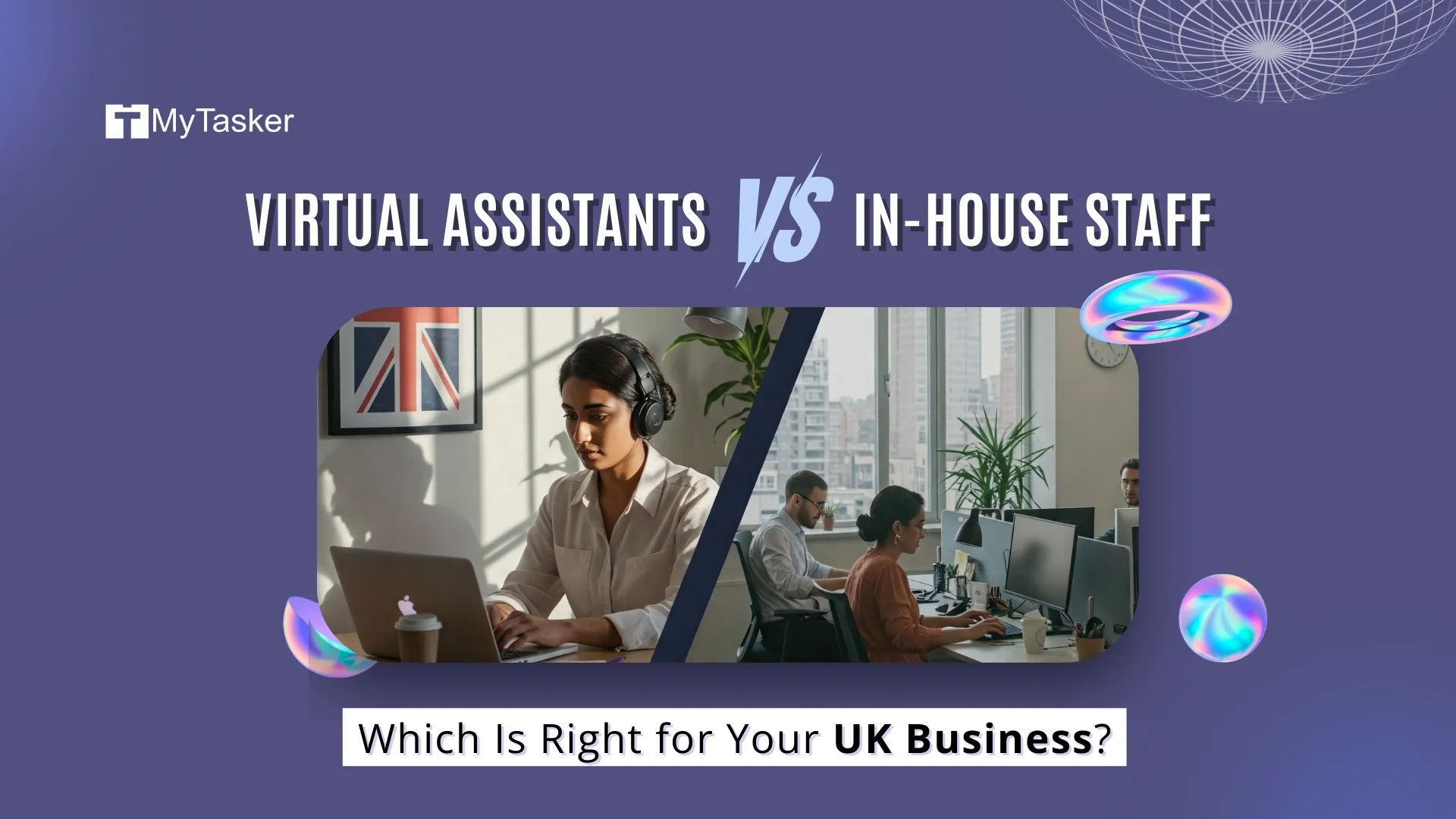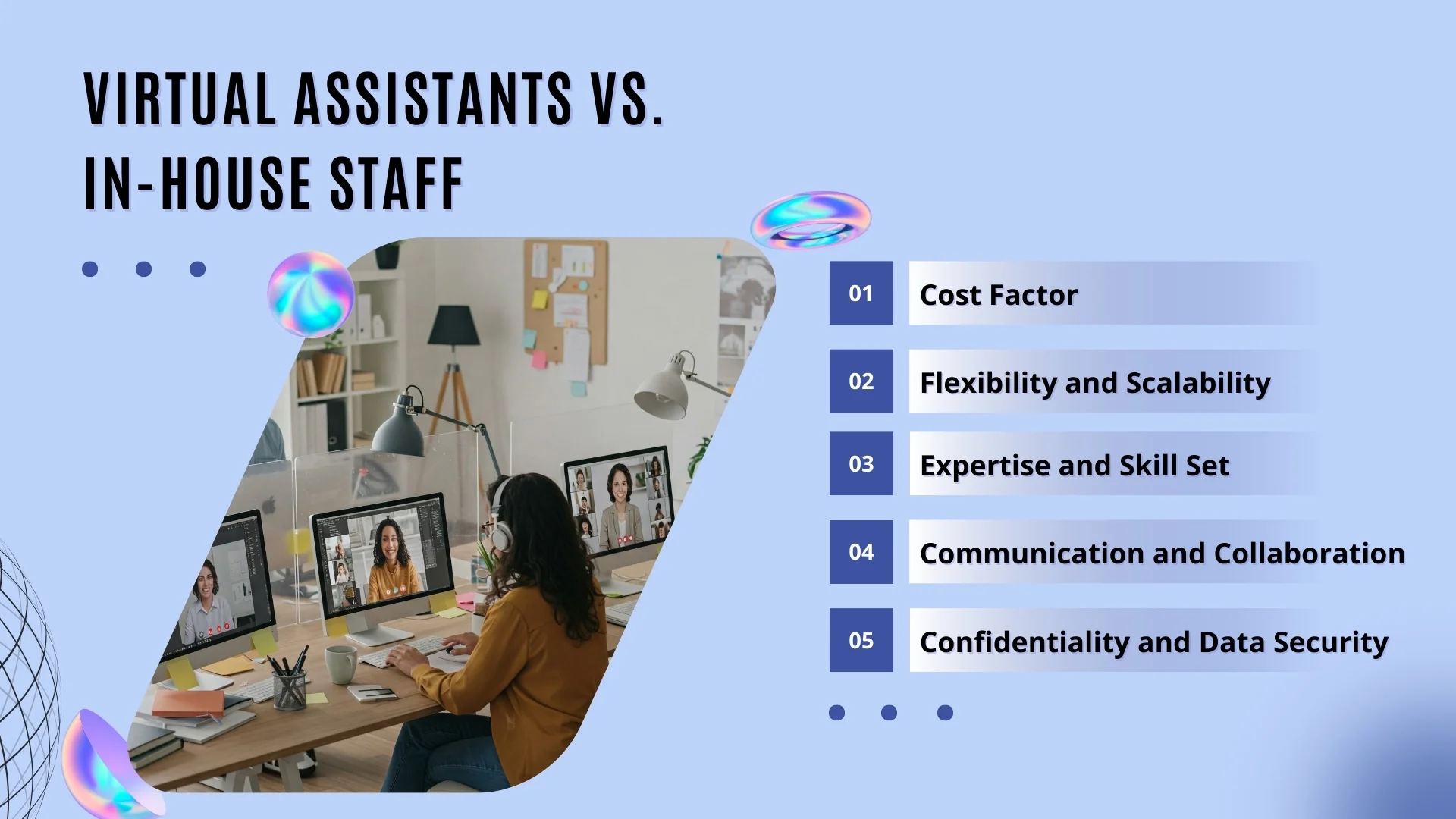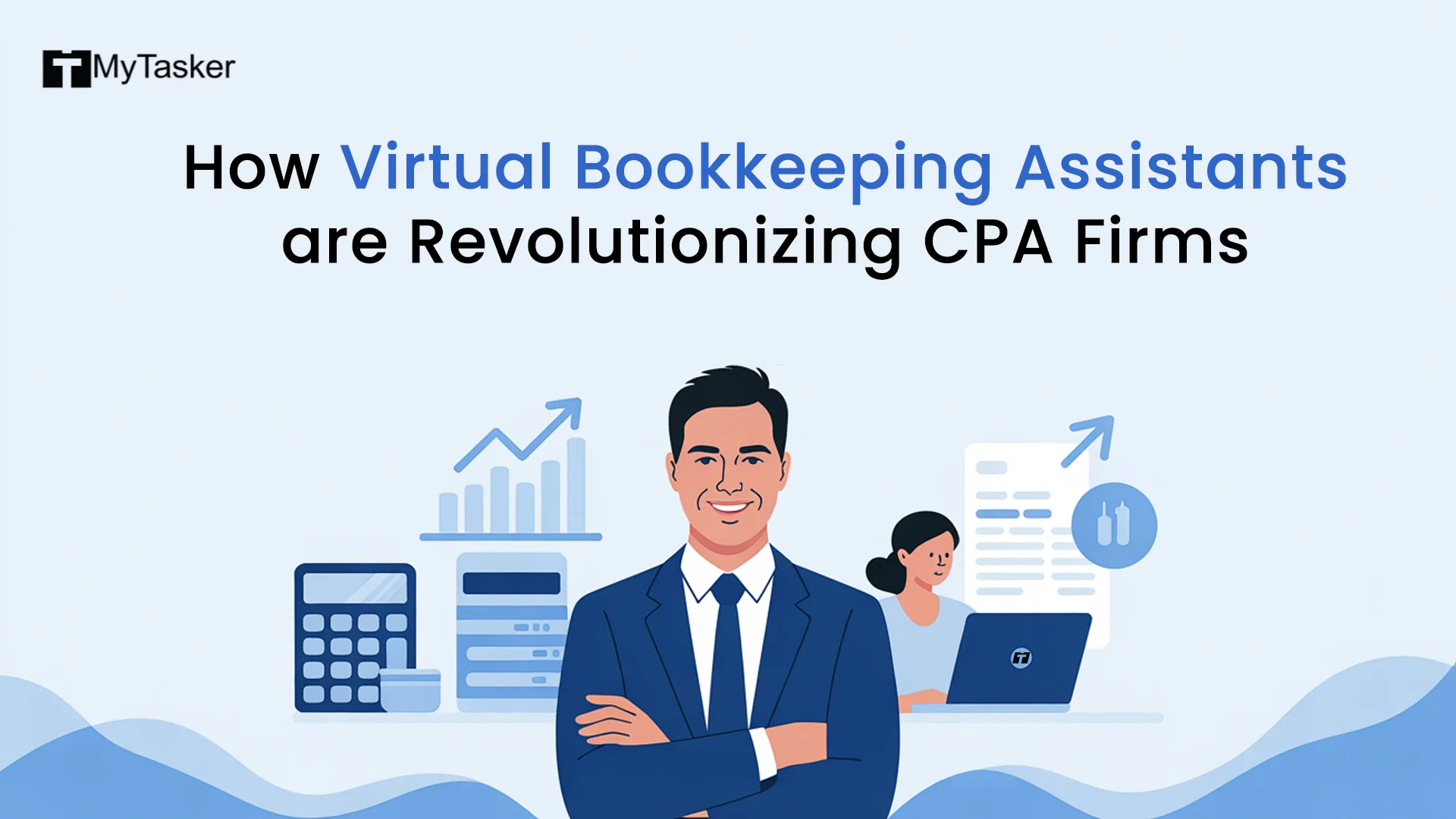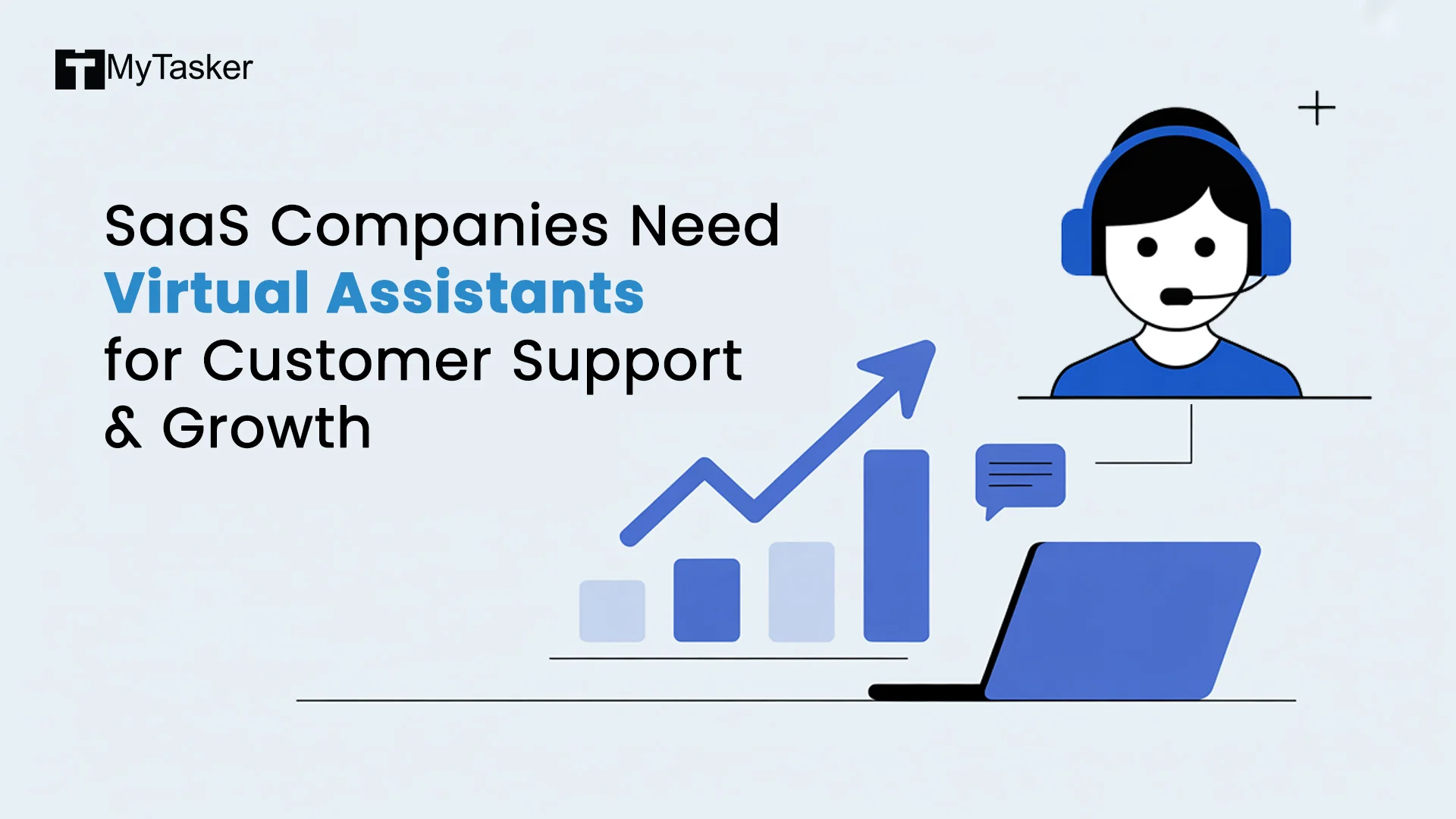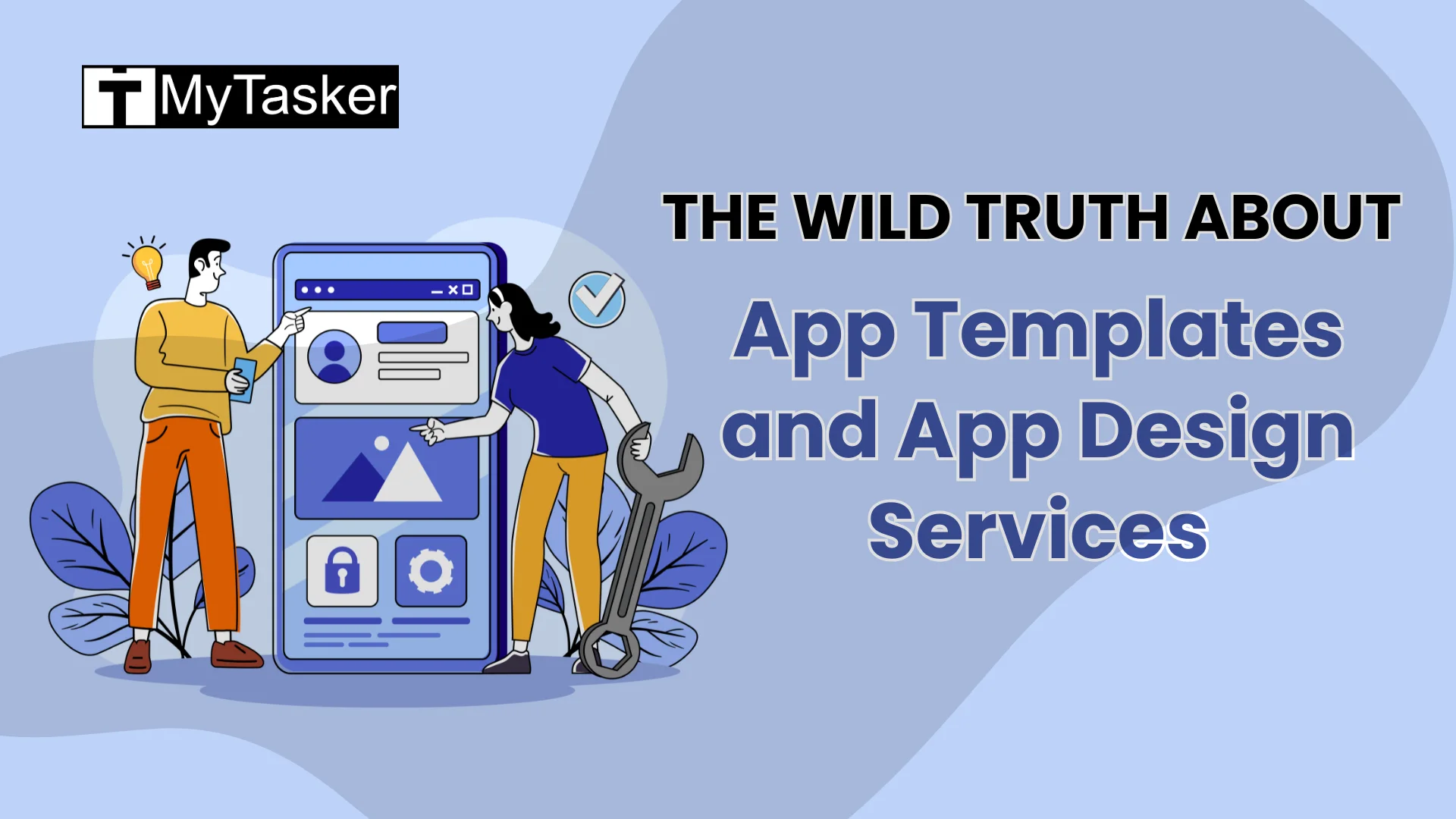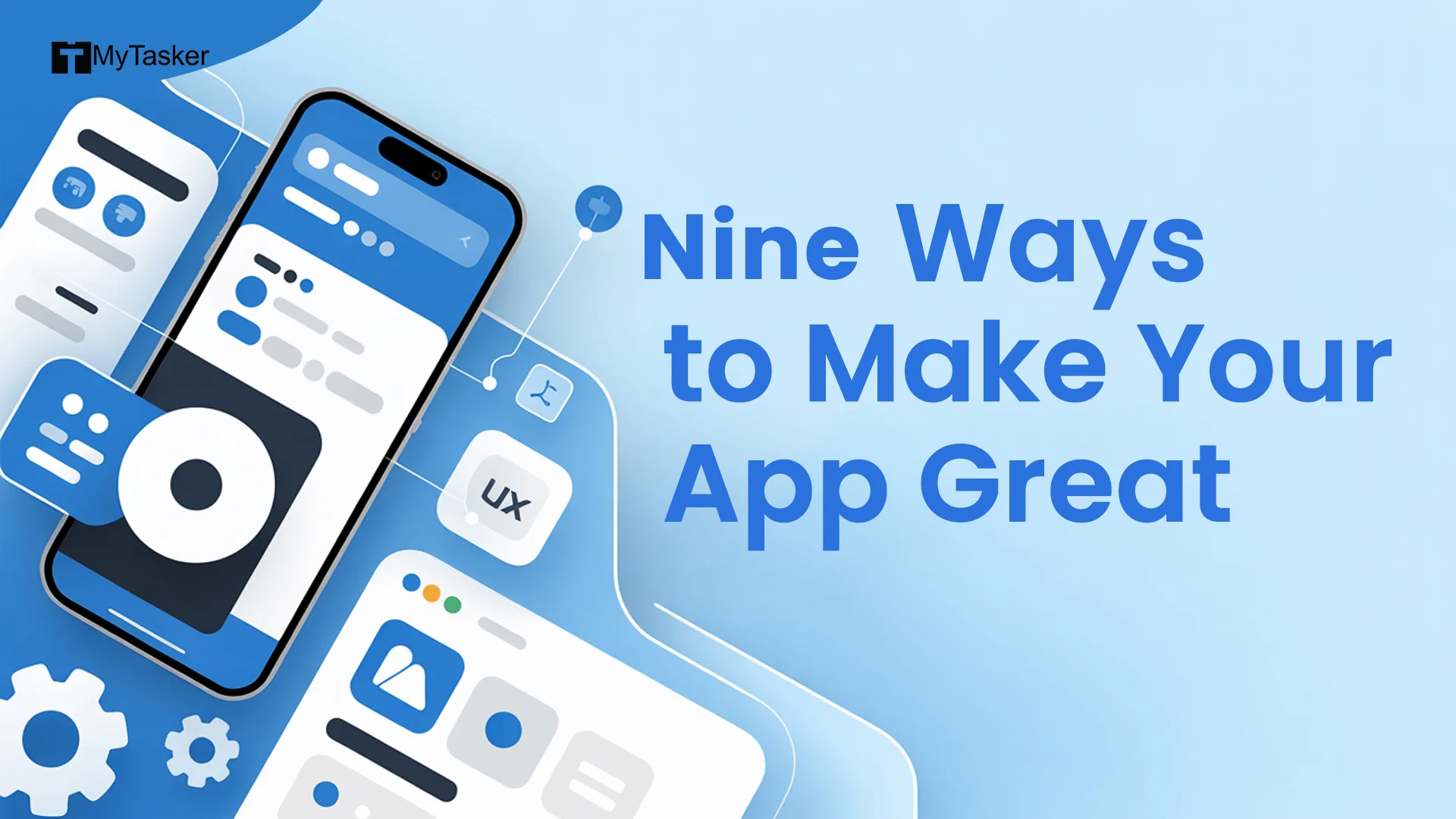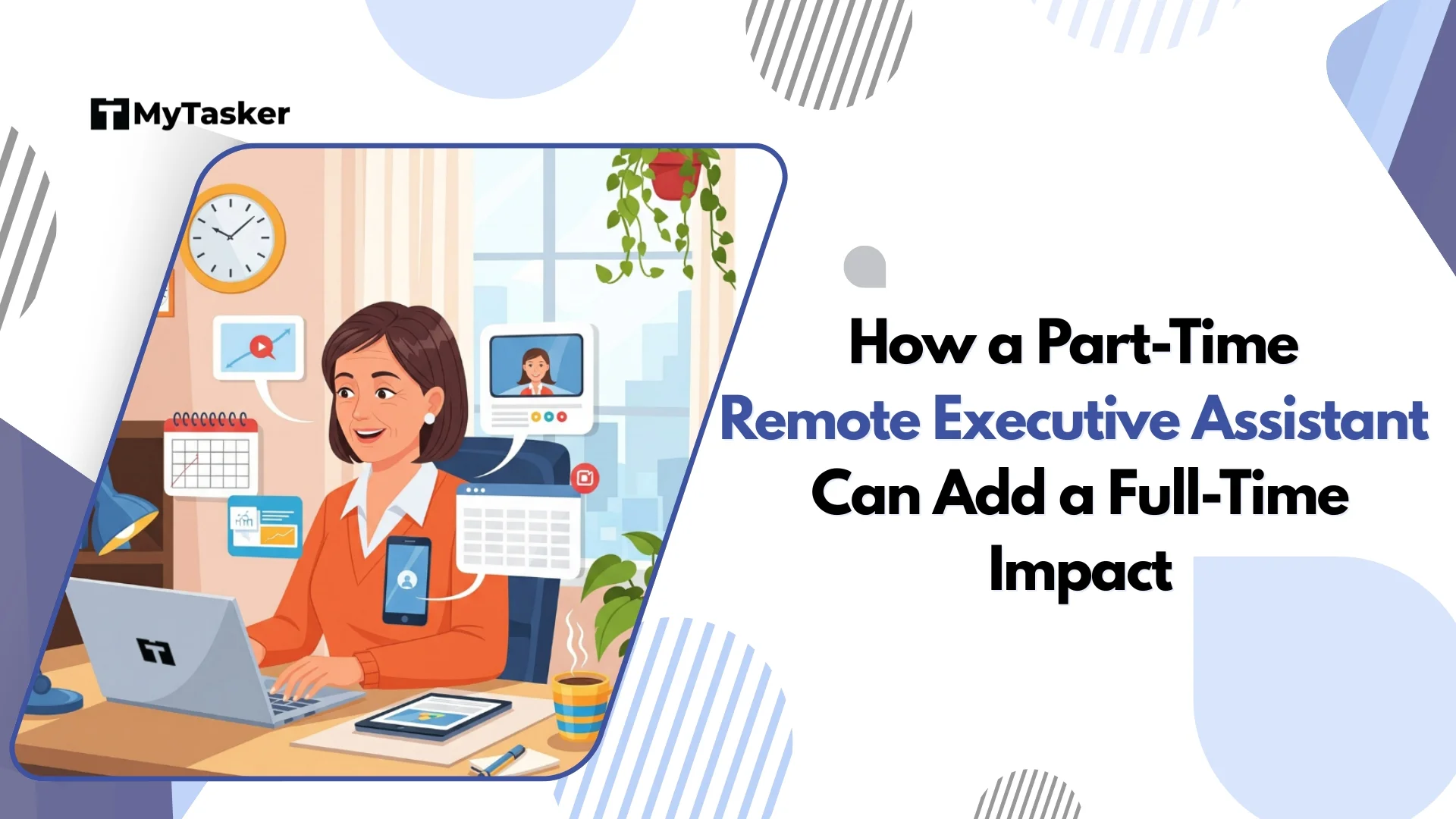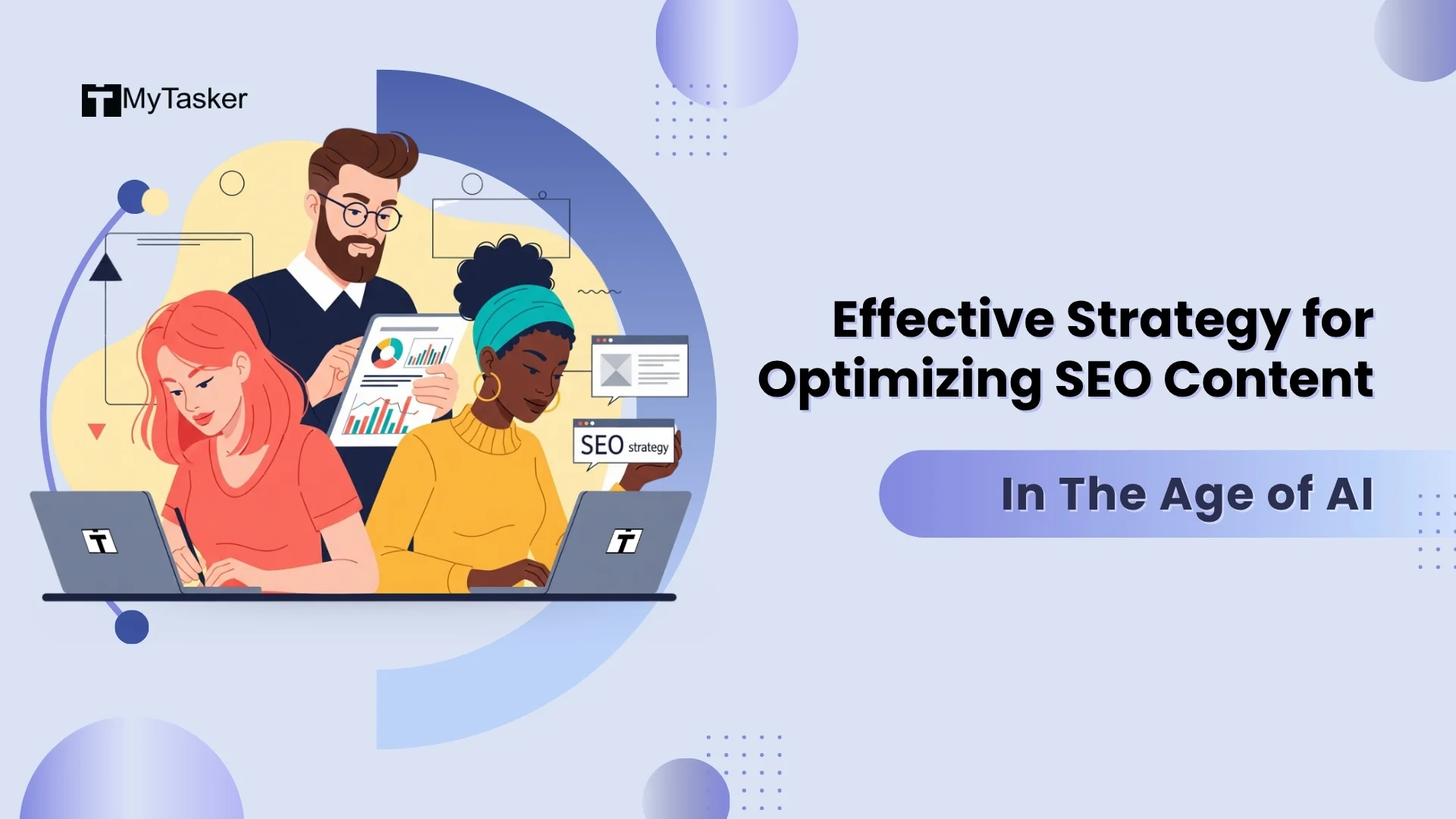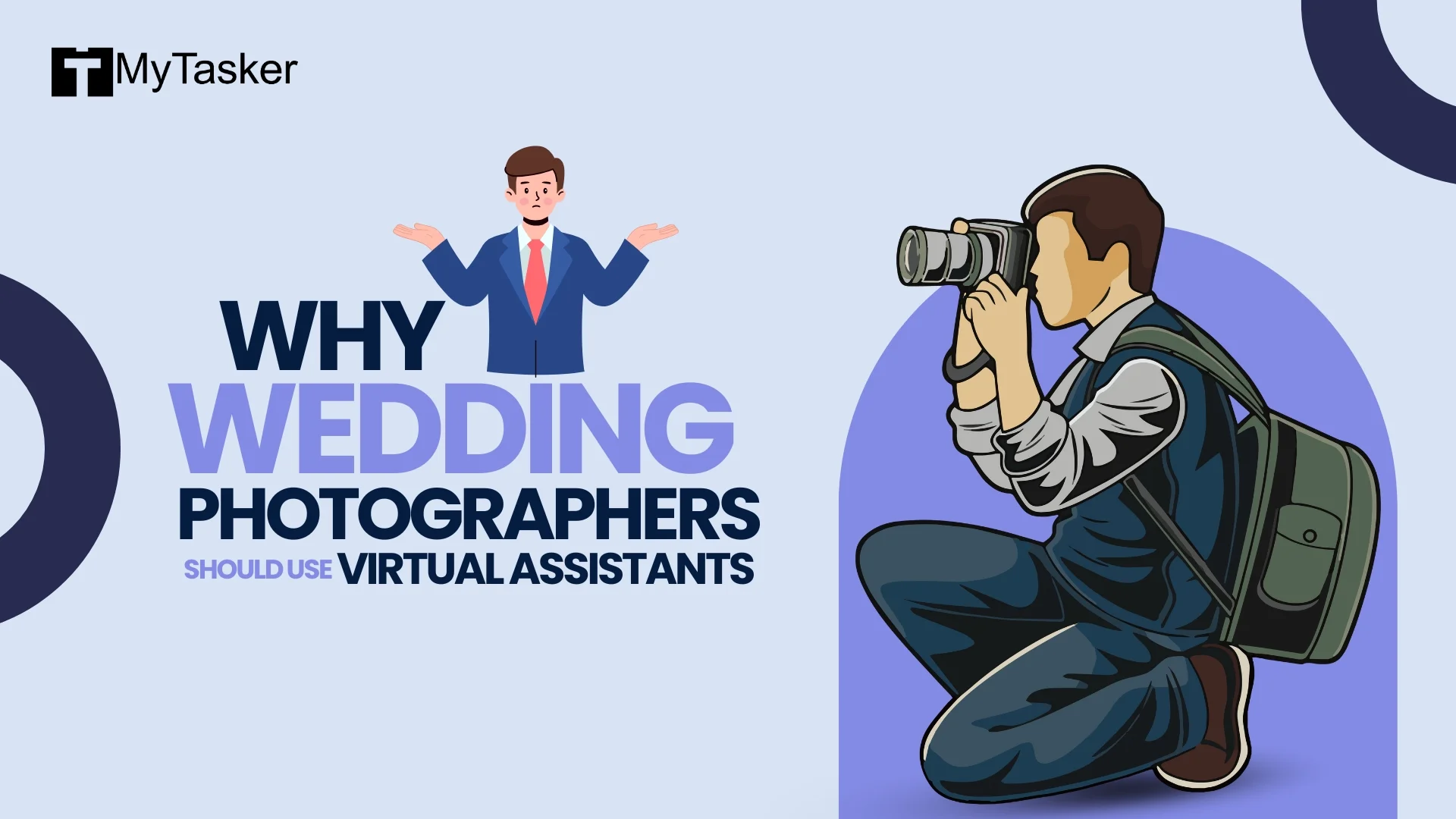Running a business in the UK can sometimes feel like navigating the London Underground during rush hour – everything’s moving at lightning speed, there’s never enough time, and you’re trying to stay on track without getting overwhelmed.
At some point, we all need that extra pair of hands to help keep things from going off the rails. Whether it’s juggling emails, managing your calendar, or staying on top of social media, finding support can make all the difference.
But here’s the real question: do you hire someone to join the team at your office or do you look outside and bring in someone remotely to take the load off?
In this post, we’ll explore the two options – outsourcing versus hiring in-house – and help you figure out which is the best fit for your UK business.
Understanding Virtual Assistants
What is a Virtual Assistant?
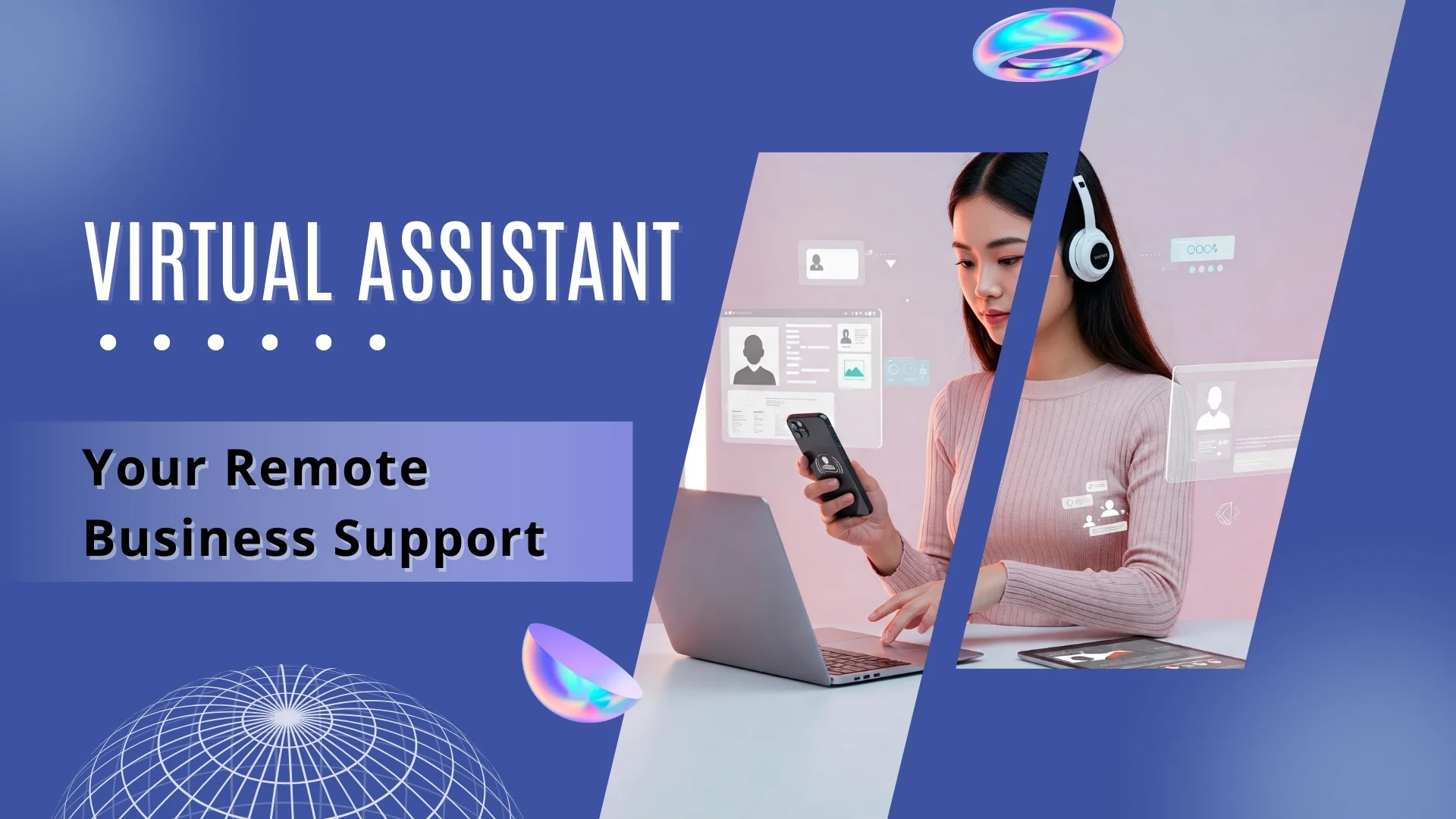
A Virtual Assistant (VA) is someone who works remotely, providing support to businesses without actually being physically present in the office. Most VAs work as independent contractors or as part of a VA agency, helping businesses across industries. They can be based anywhere in the world, but still provide the same services similarly to an in-house employee.
Types of Services Provided by a Virtual Assistant
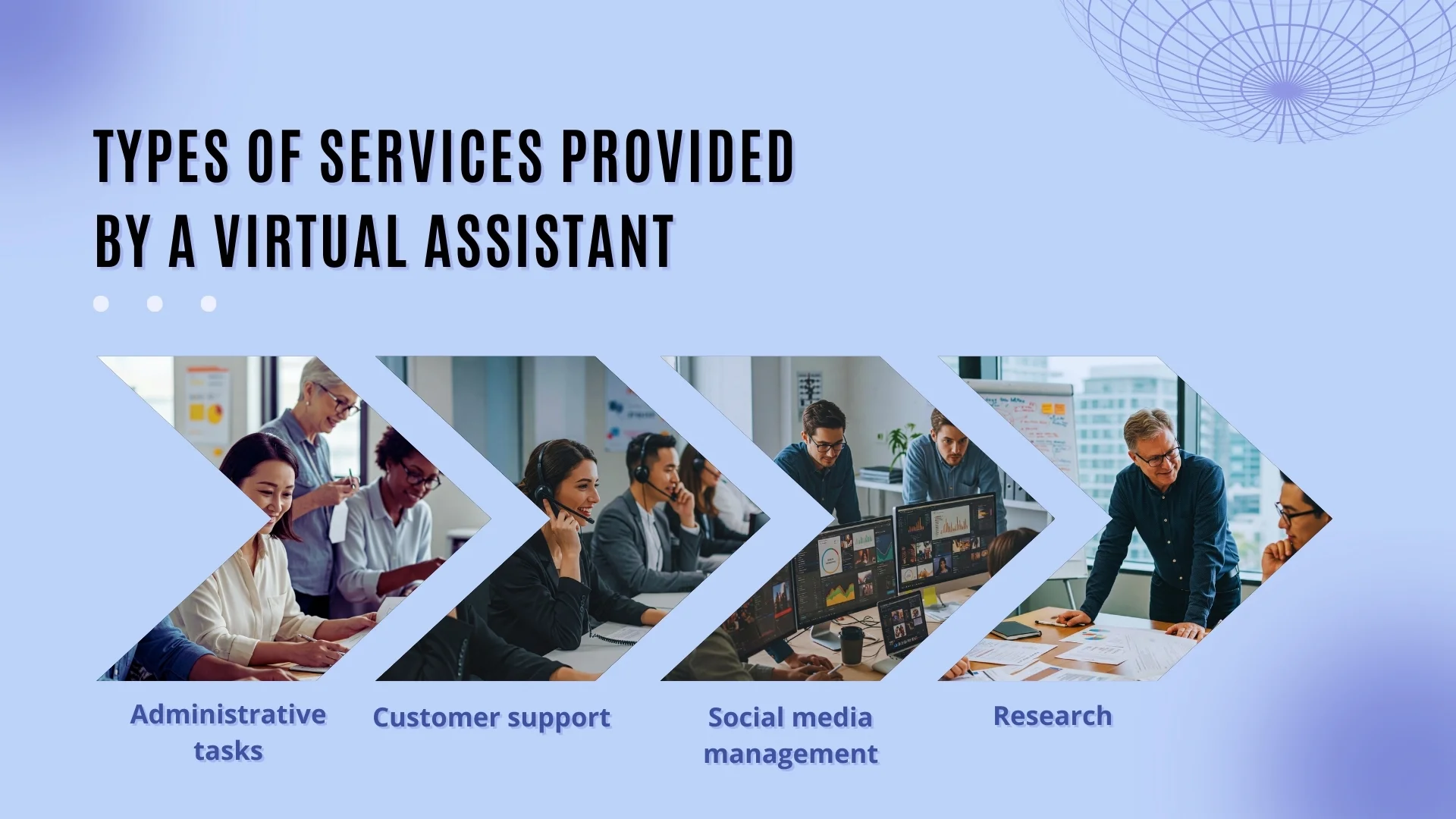
VAs can manage a wide range of administrative and other related tasks, including:
- Administrative tasks: Managing emails, scheduling appointments, and keeping your calendar in check.
- Customer support: Answering customer questions and helping with issues.
- Social media management: Creating posts, replying to comments, and engaging with followers.
- Research: Doing market research or gathering information on competitors.
For more information, you could also read our blog: How to use a Virtual Assistant.
Why Virtual Assistants are Gaining Popularity
The global virtual assistant industry is expected to grow to £5.9 billion by 2028, with an impressive annual growth rate of 33%. This fast expansion creates great opportunities both for those looking to join the field and for businesses in need of support.
The In-House Staff Model
What is In-House Staff?
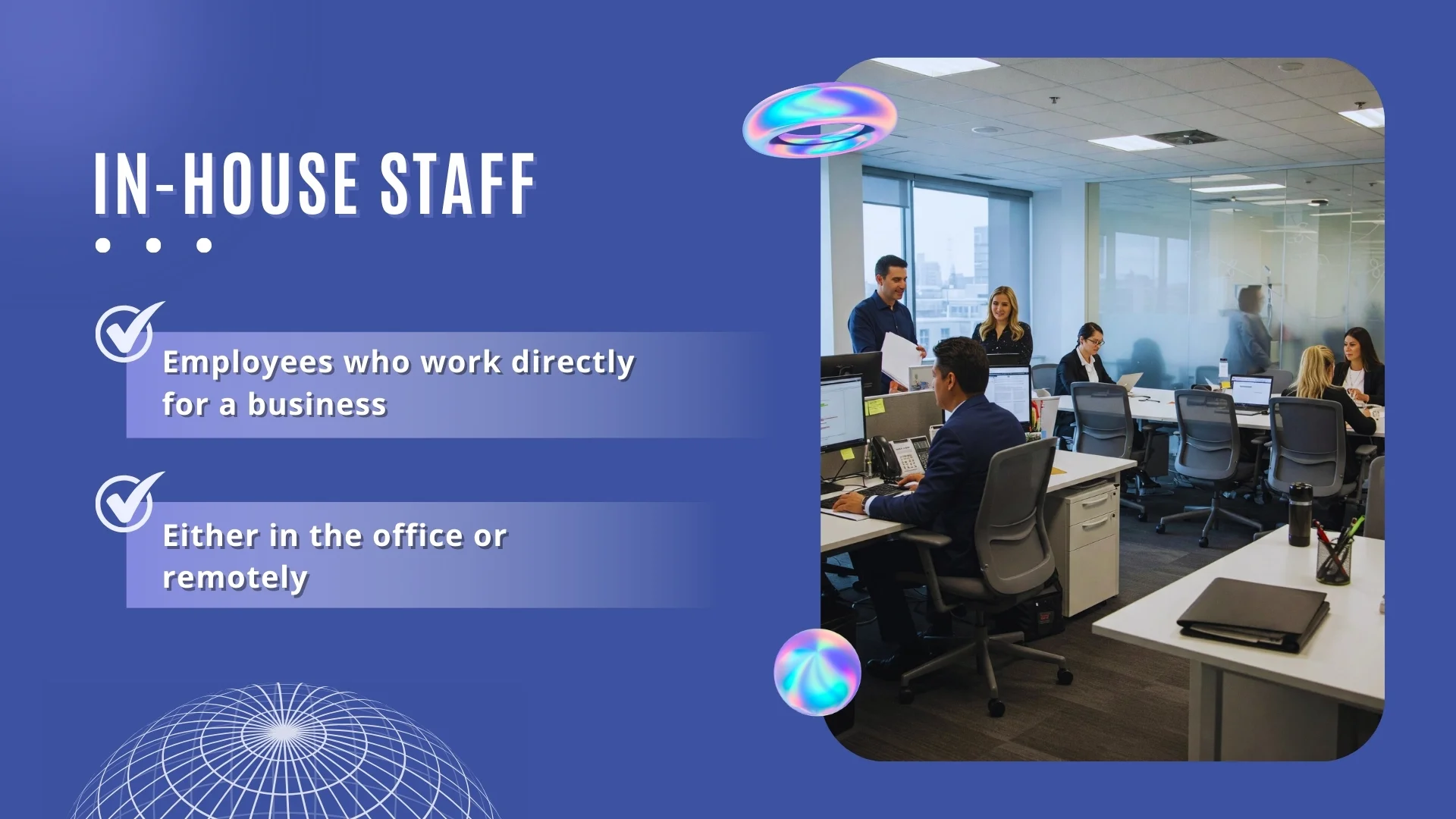
In-house staff are employees who work directly for a business, either in the office or remotely, but as full-time members of the team. They work within the company and follow the company’s rules and culture.
Common Roles
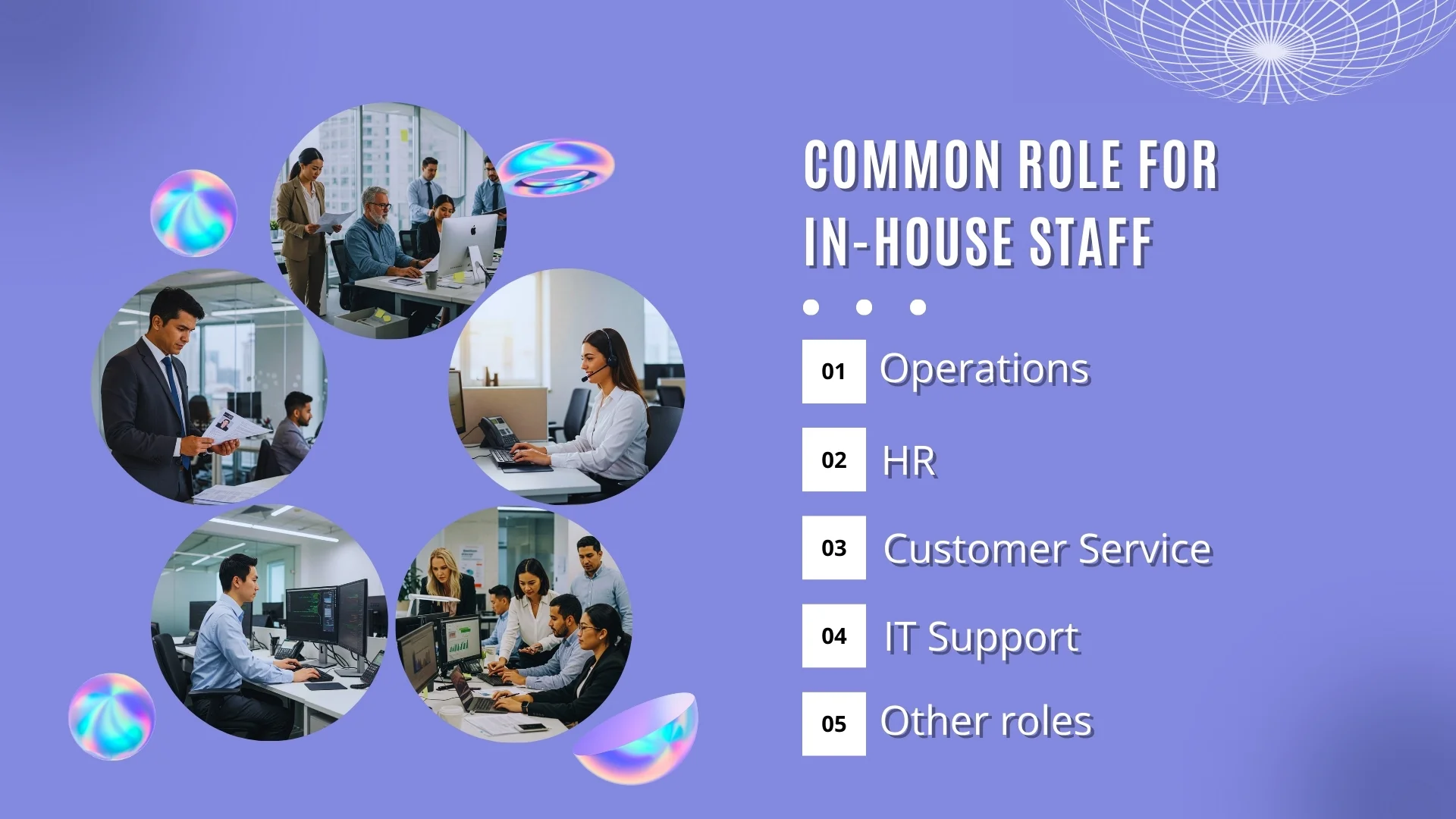
In-house teams usually have people working in different departments, such as:
- Operations: Making sure everything runs smoothly each day.
- HR: Handling hiring, employee issues, and workplace culture.
- Customer service: Helping customers with their questions or problems.
- IT support: Keeping the company’s technology running smoothly.
- Other roles: Depending on the business, you might also have in-house staff in marketing, finance, or other areas.
Cost Comparison: Virtual Assistants vs. In-House Staff
| Cost Factor | Virtual Assistants | In-house staff |
| Cost Structure | Pay-as-you-go or contract-based pricing. | Salaries, benefits, and training costs. |
| Office and Equipment | No need for office space or employee benefits. | Requires office space and equipment. |
| Employee Overheads | Flexible costs depending on workload. | Employee-related overheads (e.g., sick pay, pensions, etc.). |
Verdict: If keeping costs low is a priority, Virtual Assistants are often the more affordable option due to their flexible pricing and lack of overheads like office space and benefits.
Flexibility and Scalability
| Factor | Virtual Assistants | In-House Staff |
| Scalability | Easy to scale up or down based on business needs. | More rigid staffing structures. |
| Handling Peak Periods | Can handle peak periods, special projects, or short-term tasks. | Requires additional resources (hiring, training) for scaling up. |
Verdict: Virtual Assistants are perfect for businesses that need flexibility. They can quickly adapt to changing workloads and business needs, while in-house teams are less nimble and require more time and resources to adapt to a new organisation.
Expertise and Skill Set
| Factor | Virtual Assistants | In-House Staff |
| Specialised Expertise | VAs can specialise in various fields (e.g., social media, SEO). | More control over skill development within the business. |
| Access to Skilled Workers | Access to a global pool of skilled workers. | Stronger alignment with company culture, brand voice, and long-term goals. |
Verdict: If you need highly specialised skills quickly, hiring a Virtual Assistants gives you access to a global talent pool. On the other hand, if aligning with company culture and long-term growth is key, in-house staff could provide you more control over skill development.
Communication and Collaboration
| Factor | Virtual Assistants | In-House Staff |
| Communication | Remote communication via emails, calls, video chats, and project management tools. | Easier real-time communication and collaboration. |
| Challenges | Time zone differences, less immediate feedback. | Stronger team dynamics and face-to-face interactions. |
Verdict: In-house staff are better for communication and collaboration, offering immediate feedback and face-to-face interaction. Virtual Assistants are better suited for businesses that are comfortable with remote communication.
Confidentiality and Data Security
| Factor | Virtual Assistants | In-House Staff |
| Data Security Risks | Risk of data breaches, especially with sensitive information, unless the VA is from a trusted agency. | Easier to control data security within company premises. |
| Protection Measures | Requires clear contracts, NDAs, and trust. | In-house teams are familiar with business protocols and policies. |
Verdict: In-house staff offer greater control over confidentiality and data security.
But, with proper contracts and clear NDAs, Virtual Assistants can still be a secure option for many businesses.
Different Things Work For Different Business Needs
Whether you need a virtual assistant of an in-house employee depends largely on what type of business you are running.
Small and Start-Up Businesses
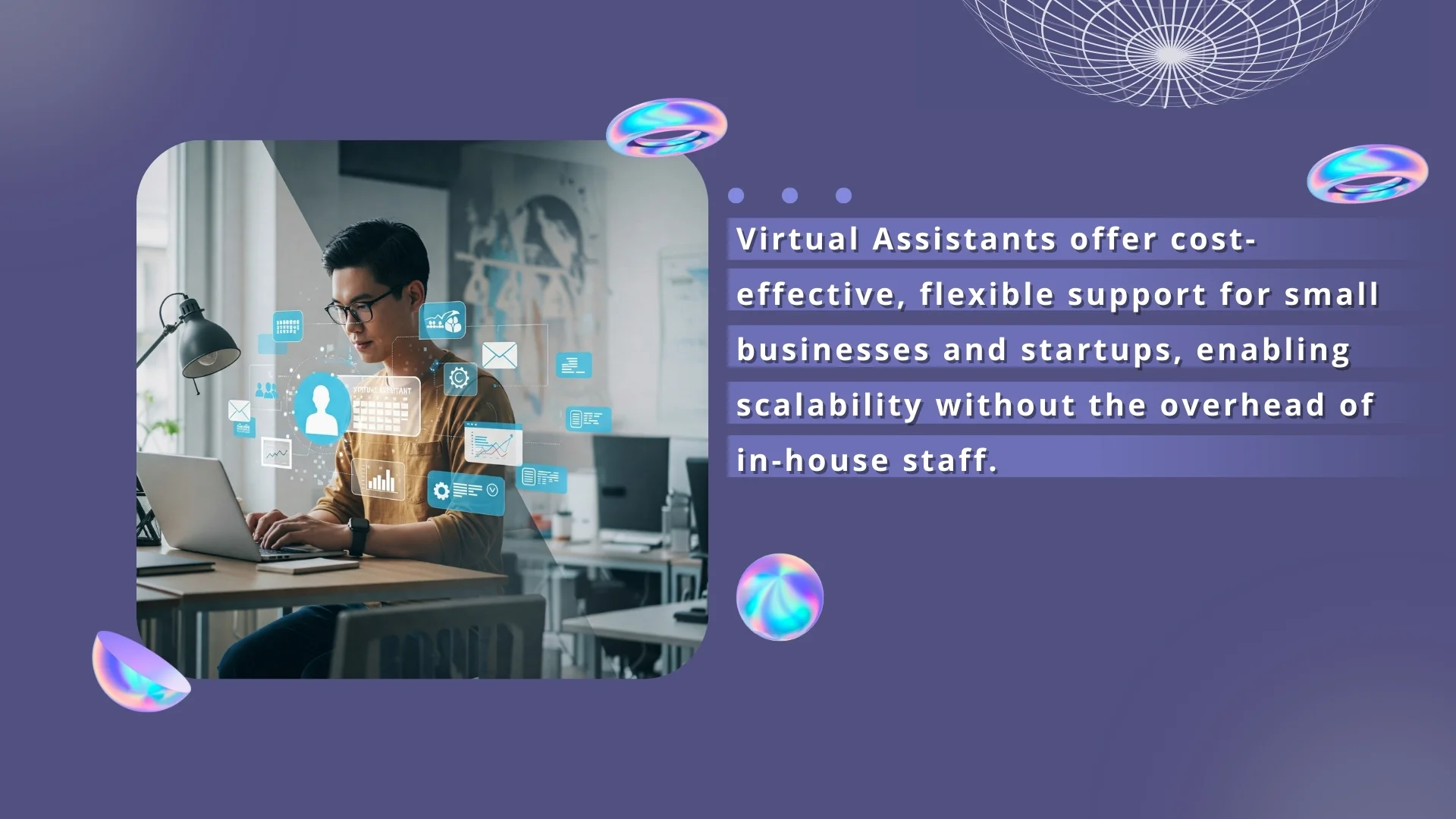
For small businesses and start-ups, every penny counts.
At this stage, you’re likely trying to keep costs low while still making a big impact. This is where Virtual Assistants really shine. VAs offer flexibility without the hefty costs that come with in-house staff. There’s no need for office space, benefits, or the usual overheads.
Plus, with VAs, you can scale up or down based on the fluctuating needs of your business.
According to a survey by ONS, at least 40% of UK employees worked from home in some capacity in 2020, and a growing number of businesses are embracing remote work. For small businesses, VAs offer a smart solution to manage tasks like social media, admin, and customer service without the long-term commitment and financial burden that in-house staff might bring.
VAs can step in quickly without the long-term commitment. They’re the perfect solution for businesses that need high-quality support, but don’t yet have the budget or the need for a full-time, in-house team.
So, if you’re just starting out or keeping things lean, VAs can give you that extra edge without breaking the bank.
Growing and Established Businesses

As your business grows, the need for stability and consistency becomes more important. This is where in-house staff may be the better choice.
Having a team that’s embedded in your company’s culture brings a level of commitment and understanding that’s hard to replicate with remote support. In-house employees are more likely to share your long-term vision and work closely with you to achieve it, which is vital when scaling up.
75% of small businesses in the UK intend to scale within the next three years. For these growing businesses, in-house staff offer the depth of expertise, teamwork, and commitment needed to manage complex projects and ensure long-term success.
For more complex tasks that require regular face-to-face collaboration or deep company-specific knowledge, in-house teams are often the ideal choice. They can handle tasks that demand consistent, real-time communication, like overseeing operations or working on highly sensitive projects.
As your business becomes more established, having a full-time team that’s part of the fabric of your company can strengthen your internal culture, drive innovation, and help with strategic planning.
Howard Schultz, former CEO of Starbucks, once said, “The key to Starbucks’ success is that we hire people who are passionate about serving others.” This sentiment rings true for many established businesses. Having an in-house team that truly understands the company culture, values, and goals is essential for maintaining quality, consistency, and long-term growth.
A Better Solution, The Hybrid Model
Combining Virtual Assistants with In-House Staff
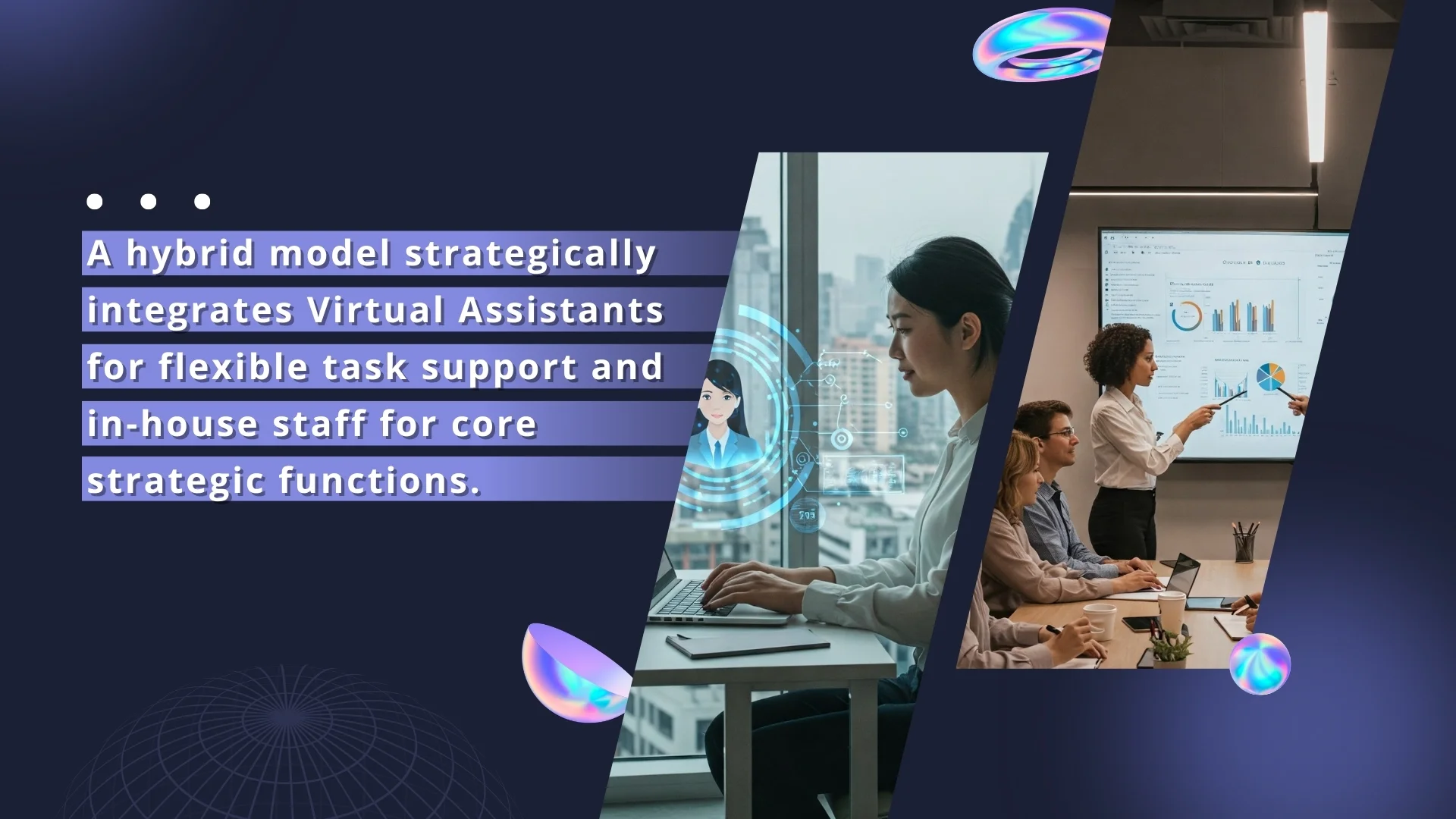
A hybrid model combines the best of both worlds by using Virtual Assistants (VAs) for certain tasks while keeping in-house staff for others.
Usually, VAs are brought in to handle administrative duties, seasonal work, or short-term projects, which helps reduce costs and keep things flexible. For example, to manage your inbox, book appointments, or handle customer service inquiries.
This gives in-house staff more time to focus on more strategic and long-term projects that require a deeper understanding of the company culture and long-term goals.
In-house employees are generally best for high-level tasks that require consistent collaboration, leadership, and in-depth company knowledge, such as developing business strategies, managing large teams, or working on product development.
The hybrid model means each group can focus on what they do best, ensuring your business stays on track without overburdening your team.
Benefits of a Hybrid Model
Flexibility
The hybrid model offers a high degree of flexibility. VAs can be brought in as needed, whether it’s for short-term projects, covering staff during holidays, or handling a sudden surge in workload. In-house teams remain focused on long-term growth, strategy, and core operations.
This balance allows businesses to scale efficiently without the need for constantly hiring or training new staff.
Cost-Effectiveness
A hybrid approach can help businesses save money. By outsourcing administrative and non-core tasks to VAs, businesses avoid the overhead costs of full-time staff, such as office space, equipment, and benefits. Meanwhile, in-house teams continue to focus on areas that truly drive business growth.
This way, you get the support you need without breaking the bank.
Access to Diverse Expertise
VAs bring diverse skills to the table, from specialised knowledge in areas like digital marketing, graphic design, or copywriting, to general administrative support. By combining their expertise with the in-depth, industry-specific knowledge of in-house teams, businesses can benefit from a broader range of skills.
This model allows companies to tap into a global talent pool while maintaining strong internal cohesion.
Why Choose Mytasker for Your Virtual Assistant Needs?

Hiring a virtual assistant is more than just outsourcing tasks—it’s about finding a reliable partner who can make your business operations smoother and more efficient. Here’s why businesses choose Mytasker when looking for virtual assistant support:
- Access to a Wide Range of Expertise: Whether it’s customer service, content creation, social media management, or specialised areas like SEO and marketing, Mytasker provides you with access to a diverse pool of skilled virtual assistants. Our VAs have expertise across various industries, so whatever your business needs, we’ve got you covered.
- Seamless Onboarding and Integration: We’ve designed a smooth and quick onboarding process to get your VA up and running fast. From day one, your assistant will be ready to help with your tasks, adapting quickly to your way of working without any hassle.
- Cost-Effective and Flexible Pricing: With Mytasker, you don’t have to worry about paying for more than you need. Our flexible pricing models allow you to choose the right level of support that fits your budget.
- 24/7 Availability: No matter your time zone, Mytasker’s virtual assistants are available to support you around the clock. Our team is there to assist you whenever you need them.
- Trusted Security and Confidentiality: We take your business’s security seriously. Every VA at Mytasker is background-checked and bound by non-disclosure agreements (NDAs) to ensure your sensitive information remains safe.
- Continuous Support and Account Management: Our dedicated account managers are always available to ensure that your VA is meeting your expectations and to assist with any questions or issues that may arise.
- Vetted, Professional Virtual Assistants: We don’t just hire anyone. Each virtual assistant at Mytasker undergoes a thorough vetting process to ensure they have the skills, experience, and professionalism needed to deliver high-quality support.
Conclusion
Choosing between a virtual assistant and in-house staff depends on your business’s size, needs, and goals.
Virtual assistants offer flexibility and cost savings, making them ideal for small businesses or those needing extra support.
In-house staff, on the other hand, are better for businesses that need direct control and consistent collaboration.
Take the time to assess what works best for you. Remember, there’s no one-size-fits-all solution—what matters most is finding the right fit for your unique business needs.
If you're looking for flexible, reliable support, Mytasker is here to help. Get in touch with us today and find the perfect virtual assistant to support your business!
